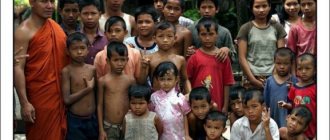Characteristics of the basic rights of children left without parental support
Children who are left without parental care, either due to their death or in the event of deprivation of parental rights, need special support and care from the state. The protection of the rights of children without parental care is regulated by a mass of legal acts of not only national but also global significance.
Regulatory regulation
The basis for legislative regulation of the protection of the rights of children left without parental care is the Convention of the Rights of the Child, adopted at the international level, which serves as the basis for other acts of law-making, the main purpose of which is to protect and defend the rights and freedoms of citizens under the age of majority, including the protection of the rights of children left without parental care
As for the regulatory regulation of the protection of the rights of children without parental care, it is carried out in accordance with the requirements of the following legislative acts:
- RF IC, in particular, Art. 155.3;
- Model regulations on an educational institution for orphans and children left without parental care;
- Federal Law “On additional guarantees for social support for orphans and children left without parental care.”
The article presents information about the fundamental rights and freedoms of the category of children in question, contained in the above-mentioned sources, as well as the conditions for their implementation and protection.
Grounds for granting a status entitling its holder to social security
In accordance with the legislation, the category of persons having the status of children left without parental support, which gives the right to social security and the provision of other material and non-material benefits, includes:
- Minors who were left orphans as a result of the death of their mother or father, or both parents;
- Citizens under 18 years of age whose parents have been deprived of parental rights by court decision;
- Children, if their parents are limited in the exercise of their parental rights in accordance with a court order;
- Minors whose parents are declared incompetent;
- Persons under 18 years of age if their parents are considered missing;
- Children whose parents have been convicted and are serving a sentence of imprisonment for a certain period, as well as in the case of the latter being appointed a preventive measure such as detention;
- Minor citizens if their parents are in specialized medical institutions;
- Minors, if their parents maliciously evade their material support and upbringing;
- Minors if their parents refused to take them away from medical, educational, and other social institutions;
- Citizens aged 18 to 23 years who were left without parental care, in cases established by law.
Rights of minors without parental care
Tangible and intangible
Social support measures for this category of children are aimed at realizing their material and non-material rights and freedoms. Material benefits include the provision of housing, food, clothing, free travel on public transport, household items and education.
The list of intangible rights contains:
- The right to study for free;
- Right to work;
- Housing rights;
- The right to use medical services free of charge;
- Right to rest;
- The right to develop abilities and interests.
Personal and property
Separately, we can highlight the personal and property rights that a child left without parental support has.
Property rights:
- Right to social security;
- The right to property that has become the property of a person on the basis of a gift agreement or by inheritance;
- Housing law, which provides for the preservation of ownership rights to residential premises assigned to a minor, despite the fact that the child lives in a state social institution;
- The right to receive housing out of turn, provided that there is no real estate owned by the person.
The personal rights that a child left without parental support has include the right to:
- Communicate freely with mother and father, if present, as well as with close relatives;
- Express their own opinion when issues regarding the implementation of their interests are resolved, as well as protect their rights by legal means, including during court proceedings;
- Live together with a guardian and members of his family until the age of 16, after which separate living is allowed, requiring prior approval from the guardianship and trusteeship authorities;
- Demand respect for honor and dignity from other persons.
Let us dwell on the basic rights of children left without parental care in more detail.
What do orphans have the right to?
What rights are reserved for orphans by Russian legislation? Housing, quota for free university education, scholarships, benefits. What else? We analyzed the legislation and, together with lawyer Anton Zharov, tried to assess fundamental rights.
Right to work. Orphans have the right to receive unemployment benefits. In Russian regions, this figure varies for citizens: from 850 to 4900 rubles. For graduates of orphanages it is different.
“Let's start with the fact that unemployment benefits are quite significant. Especially in the Moscow region it’s 50 thousand rubles. For a young man with no professional experience, this money is simply colossal. It is unlikely that anyone will promise him such a salary if he gets a job after college. Accordingly, graduates of orphanages do not go to work. But such a substantial benefit is paid only for the first six months, then other amounts come (on average, 5 thousand rubles). The young man understands this and goes to get a job. Thus, the state, as it were, extends the graduate’s childhood for another six months, providing him with money,” comments Anton Zharov.
Right to housing. An orphanage resident, upon reaching 18 years of age, has the right to receive housing from local authorities. For the first 5 years, the apartment is provided on social rental terms.
“Contrary to the prevailing opinion that Moscow fully satisfies the housing needs of orphans, about 80% of orphanages are refused by local authorities. Children are forced to go to court and seek justice. Let me remind you that we are seeing such a situation in Moscow. Now imagine what’s happening in the regions (especially subsidized ones)?” the lawyer says.
The right to education: free preparatory courses, quotas for budget-funded places in universities and colleges, free space in a dormitory, free travel on public transport, increased scholarships.
“Free preparatory courses are a myth. There are 2 types of courses: paid, which require high-quality preparation for entering a university, and free, formal courses, which are already available to all applicants. Again, not all graduates of orphanages go to universities and study there. Ask any rector how many orphans he has studying and he will count them on his fingers. In order for a child to enter a university independently and study there successfully, strong internal motivation is needed. In addition, universities are not eager to take in children from orphanages, because they constantly need to be “pushed up” in their studies,” says Zharov.
The right to free legal assistance.
“Free legal assistance is guaranteed by the state. However, to receive it, a person must collect a package of certificates and applications, since in fact nothing is free. A company that will advise a client free of charge must subsequently receive money from the state for its services. Orphans have the right to such consultation, but few can collect documents to receive legal assistance. Of course, there are legal centers in the Moscow region, but free consultation is the same as free medicine. Lawyers will help an orphan draw up a statement of claim, for example, but will not take it further to court. And this is important, because legal proceedings contain a huge number of hidden nuances. Another thing is to contact the prosecutor's office. Employees of the prosecutor's office represent the interests of orphans in the courts. In particular, on the issue of obtaining housing,” commented Anton Zharov.
There are rights, but many graduates of orphanages, entering adulthood, have no idea how to use these rights. But what can we say if many are not at all adapted to adult life, do not know how to take care of themselves, manage money correctly, etc. Of course, it is best to place a child in a family - there he will not only be surrounded with love and care, but also taught to exist in society. In addition, there are volunteer and government programs to work with orphans - teaching them social skills, motivation, communication. After all, the most important thing for all people is attention, and children from orphanages value it especially highly, because most often, this is what they are most deprived of.
The right to develop abilities and interests
The development of abilities and interests involves the creation of the necessary conditions both for minors with developmental delays and for those who have demonstrated outstanding talents. The implementation of this right is carried out in accordance with special programs developed for certain categories of children, taking into account their skills and abilities.
If a child needs correction of developmental problems, he is provided with the help of a qualified specialist, and further education is carried out according to a program aimed at promoting his abilities and promoting progress.
The right of children to receive benefits, as well as other social benefits
A child deprived of parental support has the right to the following payments and benefits:
- Alimony. In this case, the funds collected from the parents of children deprived of parental care are transferred to the account of the institution where the child lives. One half of the money goes to the maintenance of the recipient of alimony, and the second goes to his account opened in Sberbank of the Russian Federation;
- Pension;
- Social payments and benefits;
- Reduced or free travel on some types of public transport.
Which child is considered an orphan?
Before understanding benefits, it is necessary to introduce the concept of status. There are two terms that describe the situation of a child left without parental care.
- An orphan is a child whose parents have died.
- A child deprived of parental care is a small citizen who finds himself in one of the following situations:
- his parents were deprived of the right to care for their child in the manner prescribed by law;
- Mom and Dad are considered missing;
- parents have lost their legal capacity;
- mom and dad are serving time for a crime in prison, or search activities are underway against these people;
- the parents are terminally ill and are unable to care for their child.
It should be noted that many cases fall under two conditions. For example, mom died, and dad is serving time. Such a child is declared deprived of care.
The status of the child must be established by a government agency of the Russian Federation. Otherwise, orphanhood is not recognized by organizations providing benefits.
How orphans are supported
When a child loses his parents for one reason or another, his fate is determined by the state. There are two ways out of the situation:
- Place the child in a boarding school, where he will be fully supported.
- Determine a guardian for him.
The second method of deciding the fate of a minor is considered a priority in the country. That is, government officials who are in charge of resolving this issue are trying to find someone who will take care of the baby.
Moreover, if the child is under 14 years old, guardianship is established over him; Teenagers over the specified age are under guardianship.
The state encourages citizens to take such children into their families. There are institutes:
- foster family;
- family-type orphanage.
They raise children who have lost their parents.
Right to rest
The right to rest means providing the child with free time to spend leisure time in accordance with his interests and preferences. Also, the concept of proper rest includes organizing children’s free time during vacations and weekends.
Protecting the rights of children without parental care
The law guarantees the right of minor children left without parental care to judicial protection of their violated interests and provision of free legal assistance (legal consultation, drawing up a claim and other procedural documents, representation in court).
Along with a ward whose interests have been violated, his legal representative, prosecutor, as well as a representative of the guardianship and trusteeship authority, whose responsibilities include protecting the rights and freedoms of orphans and minors left without parental support, have the right to apply to the court for restoration of justice.
How to get benefits for orphans
Social protection authorities are responsible for processing cash payments.
You need to go to the local office with the following documents:
- guardian's passport;
- the orphan's birth certificate, his SNILS;
- information about the bank account for payments;
- document confirming the preferential category.
You will need to write an application at a government agency. It should be noted that benefits for paying utility bills are not provided to debtors. That is, all bills must be paid by the date of application.
Preferences in the field of education and medicine are provided by the relevant institution. To receive them, you must present a preferential certificate. The same applies to visiting cultural institutions.
Pension payments, alimony amounts, support for guardians and trustees, and other monetary preferences are handled by the guardianship and trusteeship authorities. Specialists understand all the intricacies of the situation when establishing the child’s status.





